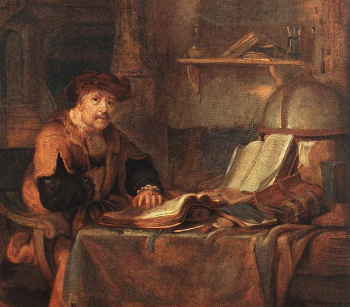Both were Pharisaic schools, but the former upheld the honor of tradition as even superior to the law, the latter despised the traditionalists when they clashed with Moses. The antagonism between them was so great, that it was said that even "Elijah the Tishbite would never be able to reconcile the disciples of Hillel and Schammai."
The Most Influential School
Of these two religious schools, that of Hillel was by far the most influential in its own day, and its decisions have been held authoritative by the greater number of later Rabbis. The most eminent ornament of this school was Gamaliel, whose fame is celebrated in the Talmud.
Hillel was the father of Simeon, and Simeon the father of Gamaliel. It has been imagined by some that Simeon was the same old man who took the infant Savior in his arms (Luke 2:25 - 35). It is difficult to give a conclusive proof of this, but there is no doubt that this Gamaliel was the same who wisely pleaded the cause of Peter and the other Apostles (Acts 5:34 - 40) and who had previously educated the future Apostle Paul (Acts 22:3).
Gamaliel's religious learning was so eminent, and his character so revered, that he is one of the seven who alone among Jewish doctors have been honored with the title of "Rabban."
Gamaliel was called the "Beauty of the Law" and it is a saying of the Talmud, that "since Rabban Gamaliel died, the glory of the Law has ceased." He was schooled a Pharisee, but anecdotes are told of him, which show that he was not trammelled by the narrow bigotry of the sect.

Gamaliel rose above the prejudices of his party. Our impulse is to class him with the best of the Pharisees, like Nicodemus and Joseph of Arimathaea. Candor and wisdom seem to have been features of his character and this agrees with what we read of him in Acts, that he was "in reputation of all the people."
It has been imagined by some that he became a Christian and why he did not become so is known only to God. But he lived and died a Jew. A wellknown prayer against Christian heretics was composed or sanctioned by him.
Gamaliel died eighteen years before the destruction of Jerusalem, about the time of apostle Paul's shipwreck at Malta, and was buried with great honor. Another of his school pupils, Onkelos, the author of the celebrated Targum, raised to him such a funeral pile of rich materials as had never before been known except at the burial of a king.
Effects of Gamaliel's Teachings
If we were briefly to specify the three effects which the religious teachings and example of Gamaliel may be supposed to have produced on the mind of Paul, they would be as follows. These three effects were candor and honesty of judgment, a willingness to study and make use of Greek authors, and a keen and watchful enthusiasm for the Jewish law. We shall see these traits of character soon exemplified in his life.
Until the formation of the later Rabbinical colleges, which flourished after the Jews were driven from Jerusalem, the instruction in the religious schools seems to have been chiefly oral. There was a prejudice against the use of any book except the Sacred Writings. The system was one of Scriptural Exegesis.
Josephus remarks that the one thing most prized by his countrymen was power in the exposition of Scripture. "They give to that man," he says, "the testimony of being a wise man, who is fully acquainted with our laws, and is able to interpret their meaning." So far as we are able to learn from our sources of information, the method of instruction was something of this kind.
At the meetings of learned religious men, some passage of the Old Testament was taken as a text, or some topic for discussion propounded in Hebrew, translated into the vernacular tongue by means of a Chaldee paraphrase and made the subject of commentary. Various interpretations were offered, aphorisms were propounded, allegories suggested and the opinions of ancient doctors quoted and discussed.
At these discussions the younger students of the religious school were present, to listen or to inquire, or, in the sacred words of Luke, "both hearing them and asking them questions."
It was a peculiarity of the Jewish schools that the pupil was encouraged to catechise the teacher. Contradictory opinions were expressed with the utmost freedom. This is evident from a cursory examination of the Talmud, which gives us the best notions of the scholastic disputes of the Jews.